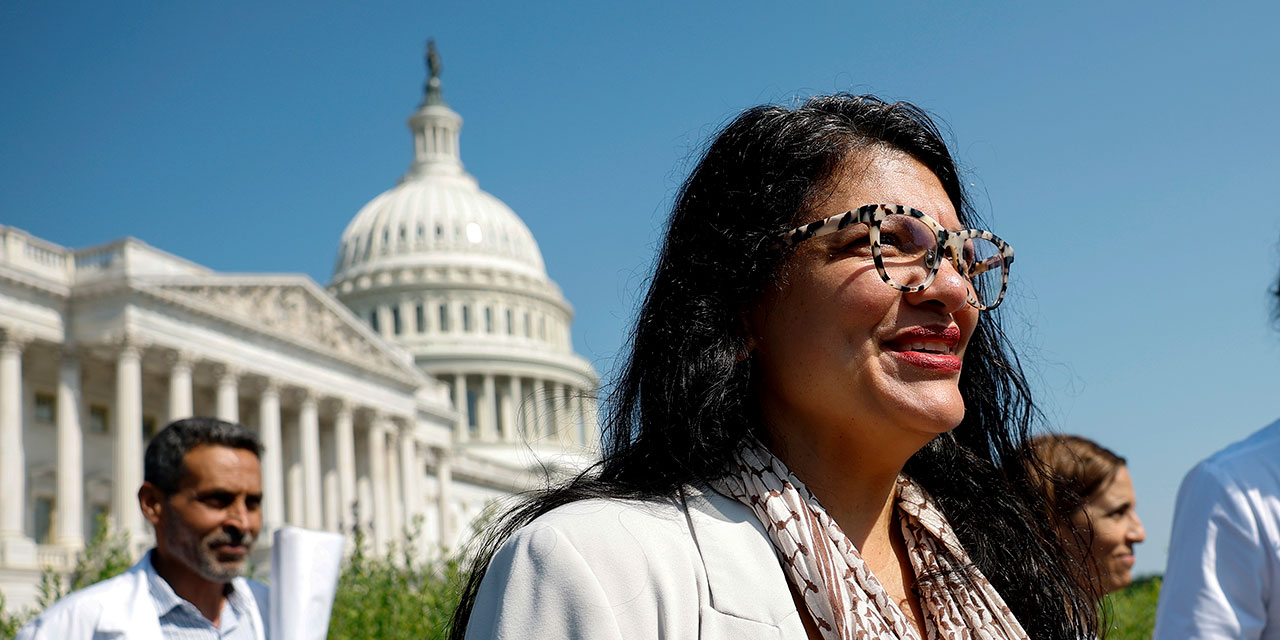
A strain of thought has gained popularity in progressive circles that’s fairly summarized by this post on X: “If there’s a Nazi at the table and ten other people sitting there talking to him, you got a table with eleven Nazis.” The principle is that some views are so abhorrent that failing to challenge them on any given occasion is tantamount to accepting them.
This line of thinking should raise an uncomfortable question for Israel bashers. What does it mean when a sitting member of Congress speaks at a conference attended by hundreds of terrorism sympathizers?
The question isn’t rhetorical. Michigan representative Rashida Tlaib appeared at the People’s Conference for Palestine, which took place over the last few days of August in Detroit. Despite its anodyne name, the event was no routine political gathering. My Manhattan Institute colleague Stu Smith has documented the conference’s many shocking moments.
Richmond, California, mayor Eduardo Martinez set the tone by comparing Hamas, a U.S. designated terrorist organization, to a righteous child confronting a bully: “If Palestine were a schoolyard playground, I would be a Palestinian. And that part of me that couldn’t endure the abuse anymore would be Hamas.” Even before leading the October 7 atrocities and taking hostages (many of whom remain in captivity today), Hamas operated as a kleptocratic dictatorship. The organization has made life unbearable for ordinary Gazans by stealing aid, using resources to build terror infrastructure, and waging eternal war against Israel rather than governing.
Yet when Martinez alluded to Hamas’s violence against Israel by way of analogy, the conference crowd erupted in cheers. He wasn’t alone: Raja Abdulhaq, founder of the Islamic Jihad-linked Quds News Network, echoed the love for those who “push back against American hegemony” in the Middle East, “groups like Hezbollah and Islamic Jihad and Hamas in Palestine.”
The applause was just as loud when moderators introduced Omar Assaf as a “freed political prisoner.” Assaf is allegedly a former member of the Democratic Front for the Liberation of Palestine—until 1999 a U.S.-designated terrorist organization—and regularly criticizes the Palestinian Authority for being too conciliatory toward Israel, even as the PA continues its “pay-for-slay” program underwriting terrorism.
The crowd offered similar applause for Mumia Abu-Jamal, a convicted cop-killer who recorded a message from prison and was introduced as one of the movement’s great “teachers, guides, and reminders.”
Other speakers pushed boundaries further. Nidal Jboor, a Michigan physician and activist, called for Israeli, American, and European leaders to be “taken out” and “neutralized” for supporting Israel’s post-October 7 response.
A smiling Thaer Ahmad, another doctor, urged the crowd to look into the meaning of the word nidal to understand its “profound meanings and deep connection to [Palestine].” Follow his advice to “look up what nidal means later” and you will see that at one level it simply means “struggle,” but it also refers to the Abu Nidal Organization, a terrorist group responsible for hundreds of casualties, including the 1985 Rome and Vienna airport attacks where terrorists bombed and gunned down civilians at El Al ticket counters.
Sachin Peddada, a Ph.D. student at UMass–Amherst, summarized the conference’s sentiment: “We live in an evil country,” he said. “We have to destroy the idea of America in our heads, in our neighbors’ heads, in our comrades’ heads.” He encouraged criminal “resistance” against the American “empire,” calling for “action” like Palestine Action UK’s campaign against defense manufacturer Elbit. (The group is proscribed as a terrorist organization in the U.K.) Another unscrupulous activist even called on attendees to “intervene” in—that is, disrupt—American defense production supply chains.
One would expect anyone with pro-Western sympathies to avoid such blatant terrorist sympathizers. Politicians and activists have distanced themselves from far less controversial statements and movements. Even former Missouri representative Cori Bush decided not to attend this conference, apparently at the last minute.
Yet Congresswoman Tlaib not only failed to distance herself from the conference—she also amplified its message from the podium. “Every genocide enabler,” she thundered, “look at this room, mothef—–s. We ain’t going anywhere.” She received a standing ovation. “We are just growing and growing and growing.”
Who are “we”? At a conference where terrorist organizations, criminals, and revolutionary groups were celebrated, Tlaib didn’t merely attend; she explicitly identified herself as part of their movement, even as its spokespeople called for “taking out” Western leaders and supporting America’s sworn enemies.
Tlaib has made clear that she stands with these anti-Western radicals. Who else sits at her table? She and her Democratic colleagues should explain.
Photo by Kevin Dietsch/Getty Images
City Journal is a publication of the Manhattan Institute for Policy Research (MI), a leading free-market think tank. Are you interested in supporting the magazine? As a 501(c)(3) nonprofit, donations in support of MI and City Journal are fully tax-deductible as provided by law (EIN #13-2912529).
















